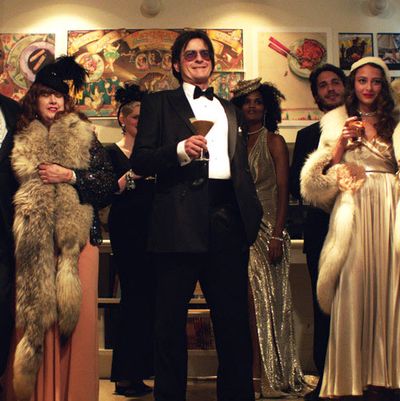
There are more great scenes in A Glimpse Inside the Mind of Charles Swan III than there are in most films in theaters today. Unfortunately, there’s also a gaping hole in the middle of it all, and its name is Charlie Sheen. Surprising, too, because you’d think that the role of a womanizing fuck-up would be one for the ages for the troubled star — the perfect vehicle for a redemptive comeback. He gives it a shot, but cool insincerity can only take you so far.
Written and directed by Roman Coppola (son of Francis, brother of Sofia), Charles Swan unfolds as a series of colorful and impeccably filmed genre-hopping set pieces, in what feels at times like a kind of mixed-media free-for-all. It opens on hotshot designer Swan (Sheen), face obscured partially by a fedora and sunglasses, being interrogated by an offscreen voice. (“Not sleeping well?” “No.” “Hard time dealing with reality?” “Always.”) The voice asks to look inside Swan’s brain, and an animated collage reveals that most of the subject’s thoughts are about sex. It also reveals that he’s still obsessed by his recent breakup with Ivana (Katheryn Winnick), a lovely, always impeccably dressed actress represented in his mind as a pile of shoes. Indeed, Ivana intrudes upon most of Charlie’s fantasies and ersatz adventures from here on out; also showing up are Kirby Star (Jason Schwartzman), a Lenny Bruce–like comedian and confidant for whom Charlie is supposed to design an album cover, as well as his aging accountant Saul (Bill Murray). The latter often offers romantic advice with the authority of a worldly lothario, but he himself is reeling from a breakup with his wife of two decades. Behind every bitter man, it seems, is a woman who broke his heart.
Coppola’s film at times seems inspired by a combination of the elliptical art-house cinema of the sixties and the stylized sex romps of the same era. (His last feature, 2001’s CQ, attempted something similar, cross-breeding David Holzman’s Diary with Barbarella.) In one scene, Charlie imagines himself receiving an award for “Best Bullshit” from the Academy of Sexy Women; in another, he and Kirby get lost inside one of Kirby’s Western-inspired album covers and are attacked by scantily clad female “Indians,” led by Ivana, who shoots an arrow through Charlie’s heart.
If that sounds a bit misogynistic, that’s because it is, but consciously so, as if it’s all building up to something. The role-playing fantasies of Charlie’s mind reveal his inability to face reality — that his obsession with Ivana is actually a method of avoidance. More a projection of his inner demons than a flesh-and-blood person, she pops up in his subconscious to torment him, sort of like a more scantily clad version of Leonardo DiCaprio’s dead wife in Inception. And amid all the goofy pastiche, there are moments of haunting beauty: A wordless flashback in which Ivana and Charlie argue about his affairs as their Cadillac makes its way through a car wash is both agitating and sensuous, a perfect encapsulation of how romantic longing can turn even the most terrible memories into lyrical reveries.
In recent years, Roman Coppola has had a fairly fruitful collaboration co-writing Wes Anderson’s scripts for The Darjeeling Limited and Moonrise Kingdom, and one suspects that he’s helped push Anderson’s work into more fractured, ironic territory. Left to his own devices, he’s gone even further, created a work that moves in fits and starts, as gorgeous as it is frustrating. And he almost gets away with it before his movie starts to collapse. At first, the standoffish quality that Sheen brings to the role suits it nicely: He is, after all, playing a character who’s shut himself off to the world, for whom everything and everybody is an object or a fantasy. But as the film progresses, the actor fails to progress with it: As Charles Swan seems to become more aware of his loneliness, Charlie Sheen seems to become more protective of his Charlie Sheen–ness. He can’t seem to access the vulnerability he brought as a young actor to early parts in films like Wall Street and Eight Men Out anymore. It’s not that he doesn’t seem to be trying; Swan does get some later moments when he appears to have become self-aware, but Sheen just can’t convince us of the turnaround. The character seems like a jerk lost inside what might have otherwise been a beautiful film.


